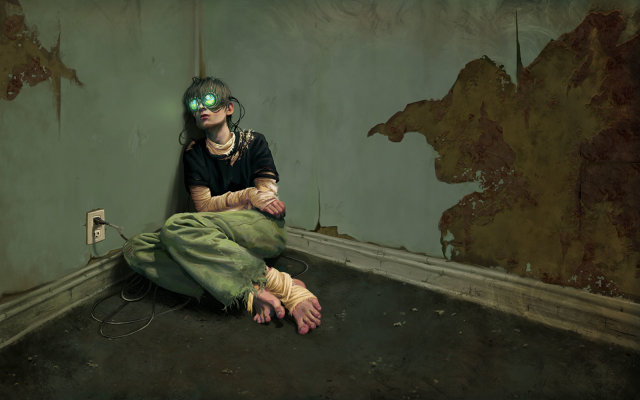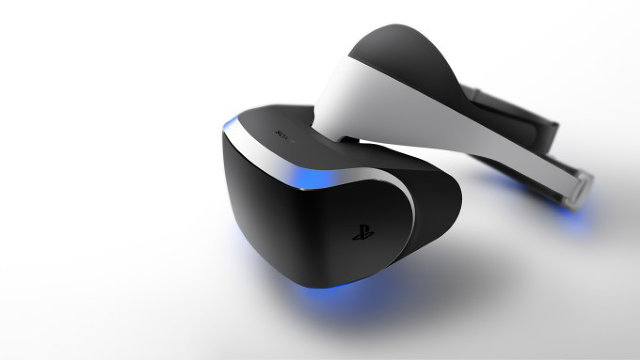Science fiction has always presaged the advent of actual technology, and taught us how to think about it before it comes. A century before the Apollo Space Program, Jules Verne had flown a rocketship to the moon; 40 years before the iPad, Stanley Kubrick's 2001: A Space Odysseyimagined touch-screen tablets in every bag and briefcase.
Now, the next big war in tech is coming, and it has once again been predicted by science fiction: the curious subgenre of the 1980s known as cyberpunk, which deals with the technological blurring of the lines between individuals, machines, and mega-corporations. With Google Glass, Sony's recent announcement of a virtual reality headset, and Facebook's $2 billion purchase yesterday of the company that makes the VR headset Oculus Rift, it's clear that the cyberpunk era is now here, three decades after it was first predicted by novels like Neuromancer and Snow Crash. A cyberpunk tech war is coming. Not for your pocket, desktop or living room, but for how you experience reality.

Last night, Facebook announced that it was purchasing Oculus VR, makers of the virtual reality gaming headset Oculus Rift. In a statement on the purchase, Mark Zuckerberg said that Facebook was getting ready for "the platform of tomorrow" where "you can share unbounded spaces.""Imagine enjoying a court-side seat at a game, studying in a classroom of students and teachers all over the world or consulting with a doctor face-to-face--just by putting on goggles in your home," he wrote.
Readers of cyberpunk know the platform Zuckerberg is proposing well. It's the Metaverse, the virtual reality Internet first proposed in Neal Stephenson's cyberpunk masterpiece Snow Crash. The similarity is no accident: John Carmack (Oculus's CTO and the creator of some of the world's most advanced 3-D gaming engines over the last 10 years, from Doom to Rage) has stated in the past that Snow Crash and other cyberpunk novels have inspired much of his life's work. He says that Facebook's expertise will "avoid several embarrassing scaling [crises]" in bringing a Metaverse of millions of simultaneously connected users to life.
But Facebook is not the only company betting big on cyberpunk.
Last week, Sony unveiled Project Morpheus, a prototype headset for the PlayStation 4 that would allow players to fully immerse themselves in 360-degree virtual worlds. The Matrix allusion in the codename is surely no accident. Inspired by the Oculus Rift, Project Morpheus would allow PlayStation 4 owners to explore their video games just by physically moving their head; thanks to integration with Sony's PlayStation camera, Project Morpheus would also potentially allow players to interact with in-game objects just by reaching out and trying to touch them. In other words, it's The Lawnmower Man: virtual reality.
Yet even as Facebook and Oculus are behind the first serious push to make virtual reality viable since the early 1990s (when virtual reality was briefly promised as the next big thing, then fizzled out), Google has taken inspiration from another killer tech from cyberpunk: augmented reality, which in novels like Snow Crash turns hackers into techy "gargoyles" perpetually jacked into the Internet who can access information on people or things just by looking them. The result is Google Glass.

These products might seem very different, but in a way, the distinction between augmented and virtual reality matters less than you might think. They are both challenging our core perspective on the world. While Sony focuses on allowing people to escape their reality to virtual realms to battle orcs or pilot starfighters in far-off space battles, and Oculus tries to build Facebook out into a Metaverse, Google is concentrating on making sure that the real world is always seen through the lens of its services.
Android Wear, Google's other alternate reality play, also falls under this umbrella: the only distinction between it and Glass is how literal the lens is. Consider, for example, the Android Wear preview video. It seems cheery and modern, nothing like the clunky, cathode-ray aesthetic predicted by cyberpunk writers, but in functionality, Android Wear is straight out of Neuromancer. It shows people deciding when to leave for work, jump off the train, or swim in the ocean, all because their watch--controlled by an AI in the belly of some distant corporation--told them to. You're the interface, and Google is now your user. The tables have turned.
Asked about the future of wearable tech at Fast Company's 2013 Innovation By Design Conference, Jawbone's Yves Béhar said that "the interface of the future is invisible." What he meant was that wearable technology would seamlessly integrate itself into our lives in such a way that it would invisibly augment us. What the cybernetic implant represented to cyberpunk authors in 1989, the iWatch is in 2014. No wonder everyone from Apple to Samsung to Jawbone is gearing up to integrate their technology, their software and their services into the very fabric of our lives.
For readers of cyberpunk, there's something slightly alarming about all of this, because cyberpunk is inherently dystopian. The fundamental theme of cyberpunk is about how the siren call of technology can blur the line between software and humanity and ultimately cause us to subvert our own sense of agency. This is perhaps why Markus "Notch" Peterson, creator of Minecraft, immediately canceled the Oculus port of the game upon hearing about the Facebook acquisition. Any reader of cyberpunk knows to be cautious when mega-corporations start investing heavily in virtual reality. Yet for others, the prospect of a Facebook-controlled Metaverse is arguably less insidious than Google's more subliminal tampering with the way we perceive the world. Facebook wants to put you in a video game, but you can always jack out. Google wants to put you in a Philip K. Dick novel, and make you uncertain about when you jacked in in the first place.
The coming of the cyberpunk age doesn't have to be a bad thing. The reason it seems so dystopian in novels and films is because we're seeing it from the outside. Cyberpunk novels describe virtual cyborgs who are essentially inseparable from the technology until it penetrates them down to the very synapses stringing their consciousness together. But ask anyone who has ever worn a Google Glass or an Oculus Rift, and they'll tell you that that's not what the experience is. From the outside-in, it seems alien; from the inside-out, it's empowering. In Snow Crash, the hero of the novel spends most of his time delivering pizza or curled up in the corner of a storage unit, wearing VR goggles, but when he takes them off, he's the world's greatest swordfighter, because he's spent endless hours in the Metaverse honing his skills.

At the end of the day, science fiction is almost always cautionary in nature. It's a way for us to come to terms with the technology of tomorrow, and train us how to think about what it will bring, decades before it actually comes. Thanks to cyberpunk, we've been preparing ourselves for decades on how to think about technology that integrates itself so seamlessly into our lives that it is inseparable from reality. What seemed scary to think about 30 years ago, perhaps we're now ready to embrace. Maybe we're all ready to be console cowboys now. We'll just call ourselves Glassholes instead.